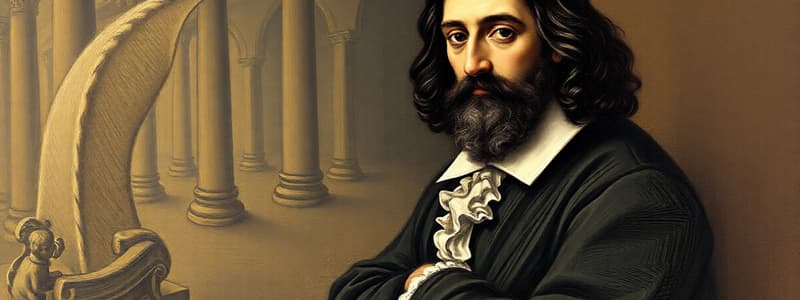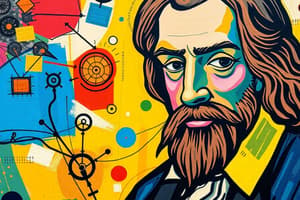Podcast
Questions and Answers
What was one reason Descartes delayed the publication of his Treatise on the World?
What was one reason Descartes delayed the publication of his Treatise on the World?
- Galileo had been condemned by the Inquisition. (correct)
- He was unsatisfied with his writing.
- He was planning a move to Sweden.
- He wanted to do more research.
What event caused Descartes' poor health during his stay in Sweden?
What event caused Descartes' poor health during his stay in Sweden?
- A lack of nutritious food.
- The demanding teaching schedule.
- The harsh Swedish winter. (correct)
- Stress from royal expectations.
Which statement best describes the Cartesian method?
Which statement best describes the Cartesian method?
- It relies solely on intuitive knowledge.
- It emphasizes emotional intelligence over logic.
- It is rooted in deductive reasoning from established facts. (correct)
- It questions the existence of the physical world.
How did Descartes' lifestyle impact his daily routine in Sweden?
How did Descartes' lifestyle impact his daily routine in Sweden?
What is the primary focus of epistemology in philosophy?
What is the primary focus of epistemology in philosophy?
What is Descartes primarily known for in philosophy?
What is Descartes primarily known for in philosophy?
Which of the following did Descartes prioritize in his philosophical approach?
Which of the following did Descartes prioritize in his philosophical approach?
What significant work did Descartes produce that marked a departure from scholastic philosophy?
What significant work did Descartes produce that marked a departure from scholastic philosophy?
What method did Descartes adopt to discover truth?
What method did Descartes adopt to discover truth?
When did Descartes claim modern philosophy began?
When did Descartes claim modern philosophy began?
What did Descartes mean by seeking the order of knowing rather than the order of being?
What did Descartes mean by seeking the order of knowing rather than the order of being?
What characteristic of Descartes' writing style is highlighted in the discussion?
What characteristic of Descartes' writing style is highlighted in the discussion?
What did Descartes aim to avoid in his philosophical inquiry?
What did Descartes aim to avoid in his philosophical inquiry?
What is the view of empiricists regarding synthetic a priori statements?
What is the view of empiricists regarding synthetic a priori statements?
What key concept did Descartes utilize to justify belief in the existence of physical bodies?
What key concept did Descartes utilize to justify belief in the existence of physical bodies?
Which of the following claims aligns with rationalist beliefs?
Which of the following claims aligns with rationalist beliefs?
How are Descartes' methodological rules best described?
How are Descartes' methodological rules best described?
What characterizes the philosophical approach of Descartes in relation to past traditions?
What characterizes the philosophical approach of Descartes in relation to past traditions?
How did Descartes differentiate the mind from the body?
How did Descartes differentiate the mind from the body?
What analogy did Descartes use to explain the relationship between mind and body?
What analogy did Descartes use to explain the relationship between mind and body?
What is the primary basis for Descartes' proof of external bodies?
What is the primary basis for Descartes' proof of external bodies?
How does Descartes define knowledge of objects?
How does Descartes define knowledge of objects?
What does Descartes suggest implies the existence of perfection?
What does Descartes suggest implies the existence of perfection?
What philosophical argument did Descartes use to support his belief in God?
What philosophical argument did Descartes use to support his belief in God?
What conclusion does Descartes reach regarding existence and perfection?
What conclusion does Descartes reach regarding existence and perfection?
What does Descartes imply about the qualities of wax?
What does Descartes imply about the qualities of wax?
What distinguishes imperfect beings from perfect beings in philosophy?
What distinguishes imperfect beings from perfect beings in philosophy?
What is the term for truths that do not require empirical verification?
What is the term for truths that do not require empirical verification?
Which statement is an example of an analytic statement?
Which statement is an example of an analytic statement?
What do synthetic statements do in comparison to analytic statements?
What do synthetic statements do in comparison to analytic statements?
Which philosopher is primarily associated with rationalism?
Which philosopher is primarily associated with rationalism?
How must necessary truths be characterized?
How must necessary truths be characterized?
What is meant by a posteriori knowledge?
What is meant by a posteriori knowledge?
Which of the following is an example of a necessary truth?
Which of the following is an example of a necessary truth?
Study Notes
Descartes' Life and Influence
- Publication of Descartes' "Treatise on the World" was delayed due to Galileo's condemnation by the Inquisition.
- Descartes resided mostly in Holland, benefiting from less strict censorship.
- In 1649, he was invited by Queen Christina of Sweden to teach modern philosophy.
- The harsh Swedish winter and early morning lessons negatively affected his health, leading to his illness and death on February 11, 1650, just five months after arriving.
- Descartes was a lifelong bachelor, known for kindness and generosity toward his staff, and was a devout Roman Catholic focused on reason over authority.
Philosophical Contributions
- Descartes is regarded as the founder of modern philosophy, merging the realms of philosophy and the emerging sciences of his time.
- His philosophy was exploratory rather than didactic, emphasizing clear reasoning and evident truths over traditional scholastic approaches.
- Emphasized intuition and deduction as fundamental methods for acquiring knowledge, prioritizing epistemology over ontology.
The Birth of Modern Philosophy
- Modern philosophy is marked by Descartes' experience on November 10, 1619, during which he conceptualized a universal method for discovering truth while in a heated room.
- The first significant modern philosophical work, "Discourse on Method," was published in French, aimed at making philosophy accessible to the general populace.
- Descartes established four foundational rules in his philosophical methodology, advocating for clarity and simplicity in thought.
Cartesian Methodology
- Descartes proposed that the mind and body are distinct, operating in parallel but not directly connected, likened to two separate alarm clocks that coordinate without interaction.
- Used the analogy of wax to illustrate that the essence of objects is comprehended by the mind rather than through sensory perception alone.
Proof of God's Existence
- Descartes' systematic doubt led him to affirm his own existence through the act of thinking, but he sought to confirm the existence of the external world by invoking the concept of God.
- Proposed the ontological argument for God's existence; the idea of perfection originates from a perfect being, thereby ensuring that imperfection (humans) relies on the existence of God.
Rationalism vs. Empiricism
- Descartes is identified as a rationalist, contrasting with empiricists who prioritize sensory experience as the basis of knowledge.
- Necessary truths (a priori) are distinct from contingent truths (a posteriori), the latter reliant on empirical verification and inconsistent across circumstances.
- Analytic statements redefine known concepts, whereas synthetic statements provide new information not contained in prior definitions.
- Rationalists argue for the existence of synthetic a priori statements, which convey new information yet must be true.
Appraisal of Descartes' Philosophy
- Despite aiming for a comprehensive break from the past, Descartes retained several medieval scholastic concepts, especially regarding God's role in affirming the existence of physical reality.
- His innovative ideas on analysis, clarity, and synthesis remain influential, with a Cartesian approach still recognized as methodical and rational.
- Descartes’ philosophical methods are seen as tools for understanding rather than rigid constraints.
Studying That Suits You
Use AI to generate personalized quizzes and flashcards to suit your learning preferences.
Description
Explore the life of René Descartes, his significant influences, and contributions to modern philosophy. Learn about his experiences in Sweden, his philosophical methods, and the impact of his work on philosophy and science. This quiz delves into his legacy and the intellectual environment of his time.




